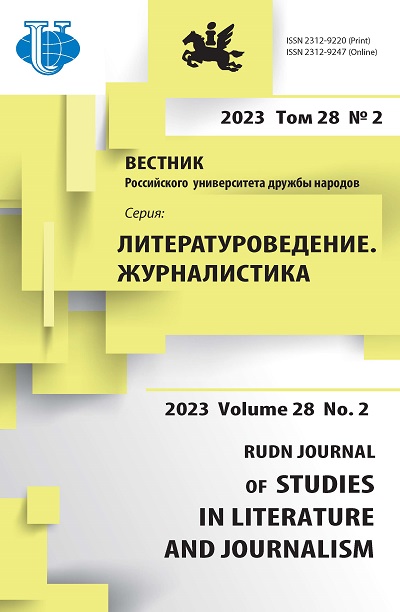Роль технологии вузовского проектного обучения в подготовке целостной медиаличности
- Авторы: Гаврилов В.В.1
-
Учреждения:
- Сургутский государственный педагогический университет
- Выпуск: Том 28, № 2 (2023)
- Страницы: 368-380
- Раздел: Журналистика
- URL: https://journal-vniispk.ru/2312-9220/article/view/318911
- DOI: https://doi.org/10.22363/2312-9220-2023-28-2-368-380
- EDN: https://elibrary.ru/IMIHBJ
- ID: 318911
Цитировать
Полный текст
Аннотация
Авторский опыт применения проектного метода при подготовке студентов-журналистов свидетельствует об эффективности и востребованности учебных проектов. Проанализированы основные тематические работы отечественных и зарубежных ученых, методистов, журналистов-практиков. Проведенный эксперимент в двух группах будущих журналистов показал, что проектирование позволяет успешно развивать обозначенные в федеральном государственном образовательном стандарте профессиональные компетенции. При этом повышается мотивация к обучению и будущей деятельности, совершенствуются навыки применения цифровых инструментов, улучшаются ораторские способности. Материалом для исследования послужила преподавательская работа автора исследования со студентами-журналистами филологического факультета Сургутского государственного педагогического университета. Использовались методы моделирования и анкетирования. Анализ результатов эксперимента позволяет сделать вывод об эффективности применения проектного метода обучения как средства формировании целостной медиаличности студента-журналиста в вузе (в рамках деятельностного подхода).
Ключевые слова
Об авторах
Виктор Викторович Гаврилов
Сургутский государственный педагогический университет
Автор, ответственный за переписку.
Email: victorg12@mail.ru
ORCID iD: 0000-0002-1279-3066
кандидат педагогических наук, доцент, доцент кафедры филологического образования и журналистики, филологический факультет
Российская Федерация, 626417, Сургут, ул. 50 лет ВЛКСМ, д. 10/2Список литературы
- Algavi, L.O., Volkova, I.I., Kadyrova, S.N., & Rastorgueva, N.E. (2021). Youth literary networks as a key to understanding generation Z. Vestnik Moskovskogo universiteta. Seriya 10. Zhurnalistika, (3), 3–21. (In Russ.) https://doi.org/10.30547/vestnik.journ.3.2021.321
- Castels, M. (2000). The information age: Economy, society and culture. Moscow: HSE University. (In Russ.)
- Couldry, N., & Hepp, A. (2016). The mediated construction of reality. Cambridge, Mass.: Polity.
- Dolničar, V., Grošelj, D., Hrast, M.F., Vehovar, V., & Petrovčič, A. (2017). The role of social support networks in proxy internet use from the intergenerational solidarity perspective. Telematics and Informatics, 35(2), 305–317. https://doi.org/10.1016/j.tele.2017.12.005
- Fateeva, I.A. (2007). Media education: Theoretical foundations and implementation practice. Chelyabinsk: Chelyabinsk State University. (In Russ.)
- Fedorov, A.V. (2003). Media education in pedagogical universities. Taganrog: Izd-vo Kuchma Publ. (In Russ.)
- Galperin, H., & Arcidiacono, M. (2019). Learning from or leaning on? The impact of children on Internet use by adults. New Media & Society, 21(2), 483–506. https://doi.org/10.1177/1461444818799996
- Gavrilov, V.V. (2022). On the issue of the development of special competencies of university journalism students in the digital age. Bulletin of Surgut State Pedagogical University, 76(1), 19–28. (In Russ.) https://doi.org/10.26105/SSPU.2022.76.1.002
- Grishchenko, N. (2020). The gap not only closes: Resistance and reverse hifts in the digital divide in Russia. Telecommunications Policy, 44(8). https://doi.org/10.1016/j.telpol.2020.102004
- Grošelj, D., Reisdorf, B.C., & Petrovčič, A. (2019). Obtaining indirect internet access: An examination how reasons for internet non-use relate to proxy internet use. Telecommunications Policy, 43(3), 213–224. https://doi.org/10.1016/j.telpol.2018.07.004
- Gukasova, M.M. (2016). Media personality and personal sphere: The limits of expansion in a socio-cultural situation. Historical and Socio-Educational Thought, 8(3‒1), 101–107. (In Russ.)
- Gukasova, M.M. (2016). Personality – the central concept of personalist philosophy: The media aspect. Bulletin of Pyatigorsk State Linguistic University, (1), 86–90. (In Russ.)
- Hampton, K.N., & Wellman, B. (2018). Lost and saved… again: The moral panic about the loss of community takes hold of social media. Contemporary Sociology. A Journal of Reviews, 47(6), 643–51. https://doi.org/10.1177/0094306118805415
- Isaeva, N.V., Evstratova, L.A., & Leshukov, O.V. (Eds). (2018). Project-based learning: Practices of implementation in universities. Moscow: HSE University. (In Russ.)
- Kirillova, N.B. (2008). Media-culture: Theory, history, practice. Moscow: Kultyra Publ.: Akademicheskii Proekt Publ. (In Russ.)
- Kirillova, N.B. (2014). “Homo medium” as the object and subject of the information age. Bulletin of Chelyabinsk State University, 17(346), 17–23. (In Russ.)
- Kolomiets, V.P. (2020). Mediatization of media. Moscow: MSU. (In Russ.)
- Miasnikova, M.A. (2014). Practical training of art journalists in the framework of professional media education. Pedagogical Education in Russia, (12), 117–121. (In Russ.)
- Munier, E. (1993). Personalism. Moscow: INION Publ. (In Russ.)
- Shesterkina, L.P. (Ed). (2018). Universal Journalism: the Experience of Project-Based Learning. Chelyabinsk: SUSU Publ. (In Russ.)
- Shilina, M.G. (2022). Mediatization in the new normal as transgression: From metaphor to concept? Russian PR: Trends and Drivers: Collection of Scientific Works in Honor of Professor V.N. Stepanov (pp. 68–72). St. Petersburg: UNECON Publ.
- Simons, G. (2018). Brand ISIS: Interactions of the tangible and intangible environments. Journal of Political Marketing, 17(4), 322–353. https://doi.org/10.1080/15377857.2018.1501928
- Simons, G. (2019). Digital communication disrupting hegemonic power in global geopolitics: New media shape new world order. Russia in Global Affairs, 17(2), 108–130. https://doi.org/10.31278/1810-6374-2019-17-2-108-130
- Tulupov, V.V. (2016). On university journalistic education. Izvestia Ural Federal University. Series 1. Problems of Education, Science and Culture, 22(3), 7–13. (In Russ.)
- Urazova, S.L. (2011). Homo informaticus as a personality type. Conflict of the spectacular and the real on the screen. VGIK Vestnik (Journal of Film Arts and Film Studies), (9), 131–139. (In Russ.)
- Urazova, S.L. (2022). Metamorphosis of media system in the perspective of digital acceleration. South Ural State University Bulletin. Social Sciences and Humanities, 22(1), 100–107. https://doi.org/10.14529/ssh220113
- Urazova, S.L., Volkova, I.I., & Pisareva, M.N. (2020). Criteria for the formation of communicative space in the student environment: immersion in creativity. Scientific Notes of Zabaikalsky State University, 15(1), 75–81. (In Russ.)
- Yefanov, A., & Tomin, V. (2022). The significance of protest mood in forming a developed civil society in Russia. Russian Politics, 7(1), 147–165. https://doi.org/10.30965/24518921-00604015
Дополнительные файлы








